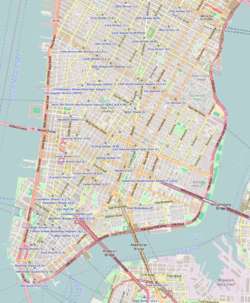| Lab/Shul | |
|---|---|
| Religion | |
| Affiliation | Judaism |
| Rite | Non-denominational Judaism |
| Ecclesiastical or organisational status | Congregation |
| Leadership | Rabbi Amichai Lau-Lavie |
| Status | Active |
| Location | |
| Location | Lower Manhattan, New York City, New York (administration office) |
| Country | United States |
Location in Lower Manhattan, New York City | |
| Geographic coordinates | 40°43′31″N74°00′22″W / 40.72539°N 74.00614°W |
| Architecture | |
| Founder | Rabbi Amichai Lau-Lavie |
| Date established | 2012 (as a congregation) |
| Website | |
| labshul | |
Lab/Shul is a non-denominational Jewish congregation located in New York City, New York, United States. The congregation was founded by Rabbi Amichai Lau-Lavie, when he was a rabbinical student. It came to fruition in 2012 as an experimental, pop-up synagogue [1] with support from the UJA-Federation, Jewish foundations, and private donors. [2] The intent of the congregation is to experiment with various forms of Jewish practice, hence "Lab" in its name. [2] As of April 2022 [update] , it has approximately 300 families as members. [3]
